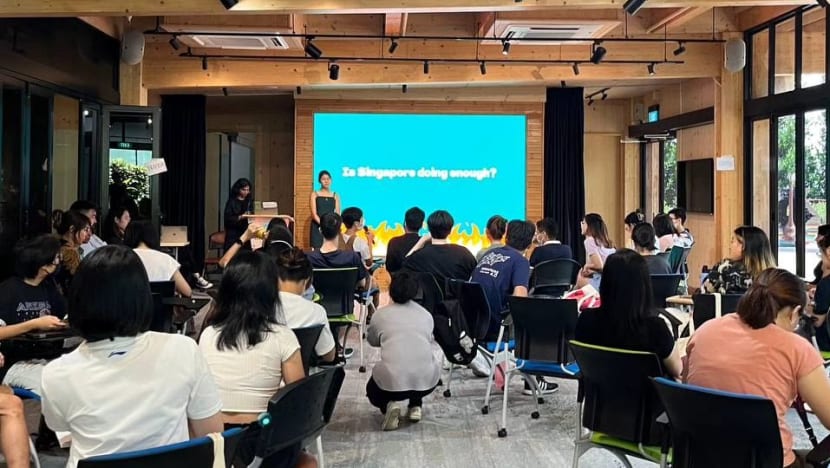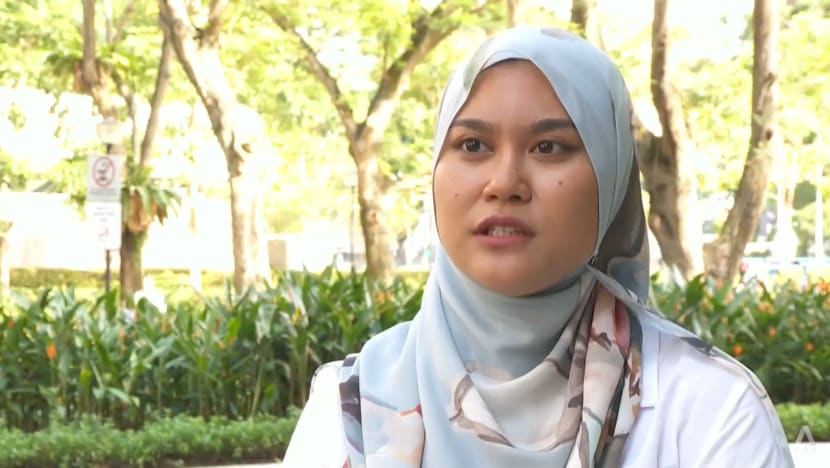Singapore to emphasise the role youths play in driving climate action as Grace Fu visits UN next week
Many youth groups are championing the cause and getting into climate action in a “very concrete way”, noted Sustainability and the Environment Minister Grace Fu.

Ms Fu said one of the key messages in Singapore's voluntary national review for the UN will be enabling today's youth to take a bigger stake in their future and getting the world to pay more attention. (Photo: Facebook/Singapore Youth for Climate Action)
SINGAPORE: Singapore will emphasise the role young people play in driving climate action when Sustainability and the Environment Minister Grace Fu delivers the country’s second voluntary national review to the United Nations next Tuesday (Jul 18).
The review will highlight the country's whole-of-nation efforts and progress towards a more sustainable, resilient and inclusive society.
The voluntary national reviews aim to facilitate the sharing of experiences, including successes, challenges and lessons learned, with a view to accelerating the implementation of the UN’s 2030 Agenda for Sustainable Development.
Areas of focus in the upcoming review include clean water and sanitation, affordable and clean energy and partnerships on goals.
Among the efforts covered in Singapore's review is its water story, which the UN is expected to highlight as an example.
ROLE OF YOUTH
In an interview with CNA, Ms Fu said one of the key messages in her update will be on enabling today's youth to take a bigger stake in their future and getting the world to pay more attention.
Young voices must be heard, and youth action taken seriously, Ms Fu said. Many youth groups are championing the cause and also getting into climate action in a “very concrete way”, she noted.
"It's not just talks and discussions. They are actually getting their hands dirty and they are focusing their resources and their time to get things done on the ground, implementing ideas," she said.
Her ministry wants to engage younger Singaporeans in many ways, including understanding the country's challenges and problems and equipping them with opportunities, she said.
"Whether it is in engagement with leaders, political leaders, exposure to other ASEAN (Association of Southeast Asian Nations) youths, or getting training and development opportunities available in our national SkillsFuture framework, we'd like to equip them with knowledge, with skill sets, and with understanding," she said.
Youths have a longer runway ahead of them, she noted.
"They're able to think about challenges that are two, three decades out that require solutions that really require long-term thinking and implementation," she said.
"So we thought that they will be a really important stakeholder in this journey of climate action."
YOUTH ADVOCACY “POWERFUL”
Among these young stakeholders picked to join Ms Fu at the UN is Ms Farah Sanwari, a youth leader behind several sustainability projects like Repair Kopitiam that promotes fixing broken appliances instead of throwing them away.
"I noticed that there were gaps in how we address sustainability issues in Singapore, particularly in consumption back when I was still a student,” she told CNA.

Ms Farah also co-founded FiTree, an Islamic environmental group to help the Muslim community understand ecological challenges and take action.
At the UN headquarters, Ms Farah will talk about the need for different voices to get things done.
“Youth advocacy is indeed powerful because we're leading the change for a future that we want and in crafting that future, I hope that we youths are also more inclusive in the way that we approach it and be more open to including the voices of everybody else beyond youths,” she said.
CHALLENGES
Singapore has made “great strides” since the last multinational review in 2018, Ms Fu said, pointing to the Singapore Green Plan 2030, which is in the process of being implemented.
However, she acknowledged that there are challenges on the way to sustainability.
Among them is the global inflation brought on by the Russian invasion of Ukraine that has plagued many countries, she said. It has caused inflationary pressures on people and a strain on the governments’ fiscal position, she noted.
“This has caused us to pause and think about what are the solutions that are needed on affordable and clean energy for example. It has also caused some of the project costs to escalate,” she said.
She added that the COVID-19 pandemic similarly caused delays and disruptions in infrastructure projects and Singapore’s plan to locally produce 30 per cent of the nation’s nutritional needs by 2030.
“Nevertheless, it also brought up new resources and new experiences for us that are positive. So for example, our experience through COVID has taught us the richness and creativity that is available in our communities,” she said.
The UN visit is part of a week-long trip on environmental sustainability. Ms Fu will also make a stop in Brussels for a climate summit and later visit Washington DC to deepen ties with the US Environmental Protection Agency.


















